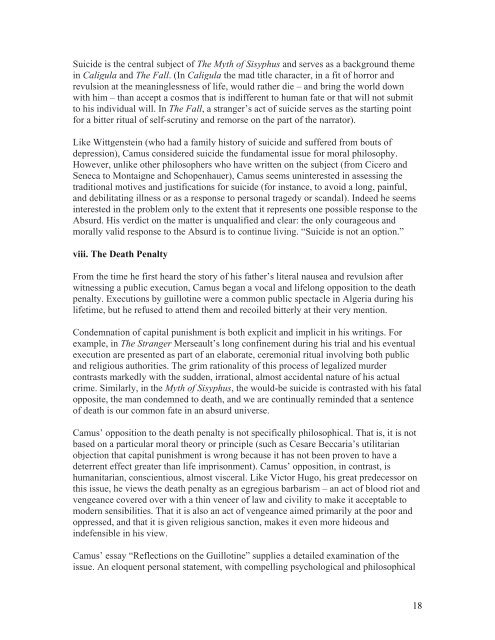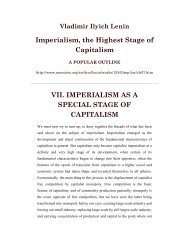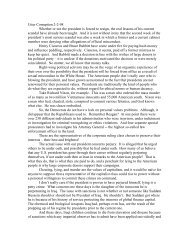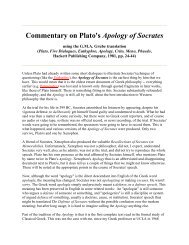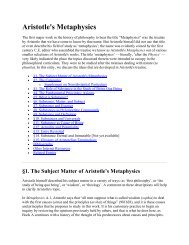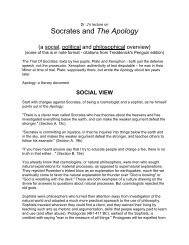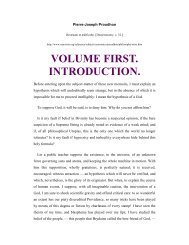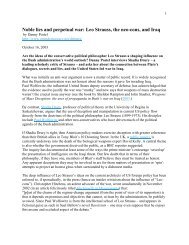Albert Camus (1913â1960) - Richard Curtis
Albert Camus (1913â1960) - Richard Curtis
Albert Camus (1913â1960) - Richard Curtis
You also want an ePaper? Increase the reach of your titles
YUMPU automatically turns print PDFs into web optimized ePapers that Google loves.
Suicide is the central subject of The Myth of Sisyphus and serves as a background theme<br />
in Caligula and The Fall. (In Caligula the mad title character, in a fit of horror and<br />
revulsion at the meaninglessness of life, would rather die – and bring the world down<br />
with him – than accept a cosmos that is indifferent to human fate or that will not submit<br />
to his individual will. In The Fall, a stranger’s act of suicide serves as the starting point<br />
for a bitter ritual of self-scrutiny and remorse on the part of the narrator).<br />
Like Wittgenstein (who had a family history of suicide and suffered from bouts of<br />
depression), <strong>Camus</strong> considered suicide the fundamental issue for moral philosophy.<br />
However, unlike other philosophers who have written on the subject (from Cicero and<br />
Seneca to Montaigne and Schopenhauer), <strong>Camus</strong> seems uninterested in assessing the<br />
traditional motives and justifications for suicide (for instance, to avoid a long, painful,<br />
and debilitating illness or as a response to personal tragedy or scandal). Indeed he seems<br />
interested in the problem only to the extent that it represents one possible response to the<br />
Absurd. His verdict on the matter is unqualified and clear: the only courageous and<br />
morally valid response to the Absurd is to continue living. “Suicide is not an option.”<br />
viii. The Death Penalty<br />
From the time he first heard the story of his father’s literal nausea and revulsion after<br />
witnessing a public execution, <strong>Camus</strong> began a vocal and lifelong opposition to the death<br />
penalty. Executions by guillotine were a common public spectacle in Algeria during his<br />
lifetime, but he refused to attend them and recoiled bitterly at their very mention.<br />
Condemnation of capital punishment is both explicit and implicit in his writings. For<br />
example, in The Stranger Merseault’s long confinement during his trial and his eventual<br />
execution are presented as part of an elaborate, ceremonial ritual involving both public<br />
and religious authorities. The grim rationality of this process of legalized murder<br />
contrasts markedly with the sudden, irrational, almost accidental nature of his actual<br />
crime. Similarly, in the Myth of Sisyphus, the would-be suicide is contrasted with his fatal<br />
opposite, the man condemned to death, and we are continually reminded that a sentence<br />
of death is our common fate in an absurd universe.<br />
<strong>Camus</strong>’ opposition to the death penalty is not specifically philosophical. That is, it is not<br />
based on a particular moral theory or principle (such as Cesare Beccaria’s utilitarian<br />
objection that capital punishment is wrong because it has not been proven to have a<br />
deterrent effect greater than life imprisonment). <strong>Camus</strong>’ opposition, in contrast, is<br />
humanitarian, conscientious, almost visceral. Like Victor Hugo, his great predecessor on<br />
this issue, he views the death penalty as an egregious barbarism – an act of blood riot and<br />
vengeance covered over with a thin veneer of law and civility to make it acceptable to<br />
modern sensibilities. That it is also an act of vengeance aimed primarily at the poor and<br />
oppressed, and that it is given religious sanction, makes it even more hideous and<br />
indefensible in his view.<br />
<strong>Camus</strong>’ essay “Reflections on the Guillotine” supplies a detailed examination of the<br />
issue. An eloquent personal statement, with compelling psychological and philosophical<br />
18


